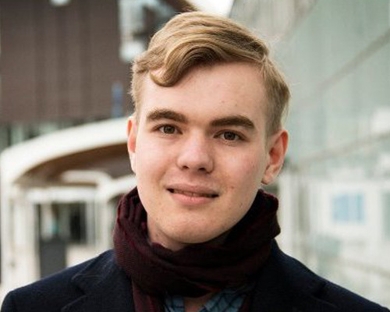
A PhD at 20
Philosopher Stefan Buijsman obtained his doctorate this year at the age of 20 at the University of Stockholm, making him the youngest PhD in Sweden. He was already taking lectures in Astronomy in Leiden when he was 12, and at 15 he started a degree programme in Information Technology. 'The first reaction was: there's a young kid wandering around here.'
How do you get a PhD so young?
‘At junior school I skipped three classes because I happened to be able to learn fast. I finished pre-university education when I was 15 and went to study information technology at Leiden University. The first reaction from fellow students was: there's a young kid wandering around here! But after a couple of weeks everyone had got used to me. I knew what it was like to be the youngest; I had been that for a long time. When I was 12 and still at school I took a number of Astronomy classes at the University, and got my study credits for them. If you get on with your work seriously, the other students soon accept you.'
‘OK, I didn't have a wild student time compared to most students. I wasn't able to drink alcohol and I lived at home with my parents, but I did have some really good contacts, thanks to the Leidsche Flesch, my study association. I finished my master's in Philosophy when I was 18 and came to Sweden to do a PhD, mainly because there are a lot more PhD positions in Sweden. The University of Stockholm has a lot of eminent philosophers; they were excellent supervisors and that helped me to get my PhD quite quickly. In Sweden they were able to access information on PhD candidates as far back as 1850 and apparently I am the youngest. In the Netherlands I share the record with Floor Sietsma. She was the same age as me to the day when she was awarded her PhD a couple of years ago.'

What is your dissertation about?
'There are all kinds of philosophical theories about how mathematicians arrive at their calculations. My argument is that these theories don't apply to ordinary people doing sums. We have no idea how they make their calculations, though theories from psychology and pedagogy can help. That's what my postdoctoral research at the University of Stockholm is about. I'm also developing teaching methods for maths. So, my philosophy research is having some practical use!'
How do you like living in Sweden?
‘I like it a lot, although the long, dark winters are tough. But the people are very friendly and certainly at the university surprisingly informal.'
What did you learn in Leiden that you still find useful today?
‘The knowledge about my field, of course, and critical thinking. I'm glad I was an honours student; it meant I was encouraged to take subjects outside my own field to see what kinds of things interested me. As an information science student, I also studied philosophy. Without that, things could have been quite different. It's something I will always be grateful to the honours track for. It's always a good idea to look beyond your own borders.'
Photo: Stefan Buijsman being congratulated by the Dutch Ambassador in Sweden, Ines Coppoolse, on obtaining his PhD.
Stefan Buijsman (1995)
Study programme: Information Science (bachelor's) and Philosophy (master's)
Association: De Leidsche Flesch
Favourite spot in Leiden: The many outdoor cafés by the water, like Annie’s.
(LvP)
